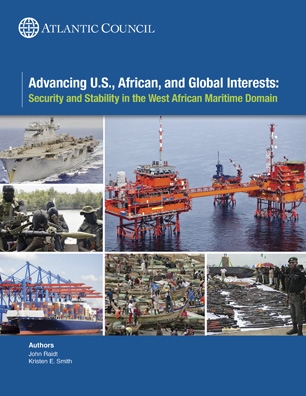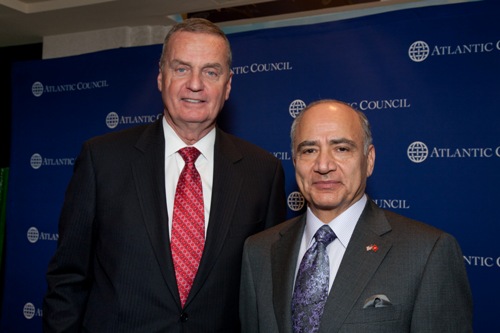The Atlantic Council’s Michael S. Ansari Africa Center and On The Horizon Project have officially released a landmark report on the rising importance of U.S. national security interests in West Africa’s Gulf of Guinea, entitled: “Advancing U.S., African, and Global Interests: Security and Stability in the West Africa Maritime Domain.”
 The Gulf of Guinea is at the brink of becoming a greater supplier of energy to the United States than the Persian Gulf and is therefore of far higher strategic importance than has historically been the case. The report calls for a high level reset in what is going to become in the near future, a vital region to maintaining U.S. energy security, prosperity, and homeland security. It does this by setting out in a practical and comprehensive way, how the United States and her partners in Africa and Europe can respond to dire threats in the maritime domain.
The Gulf of Guinea is at the brink of becoming a greater supplier of energy to the United States than the Persian Gulf and is therefore of far higher strategic importance than has historically been the case. The report calls for a high level reset in what is going to become in the near future, a vital region to maintaining U.S. energy security, prosperity, and homeland security. It does this by setting out in a practical and comprehensive way, how the United States and her partners in Africa and Europe can respond to dire threats in the maritime domain.
The report, written by John Raidt, Director, On The Horizon Project, and Kristen E. Smith, Assistant Director, Michael S. Ansari Africa Center, sounds the alarm on the deep reach of transnational terrorists, drug cartels, and other criminal enterprises in West Africa, and how, abetted by official corruption, these groups need a badly governed, poorly resourced maritime security regime to sustain their enterprises. It explores the adverse consequences for the U.S., West African countries and the broader International Community of the continued failure to counter, vigorously and proactively, adverse security, economic, and political conditions in the region.
Disturbing trends explored in the report, include:
- The use of West Africa as a transit point and operational center for the movement of narcotics from South America to Europe, enriching criminal and terrorist enterprises based in our hemisphere and hostile to the U.S.
- The ripening conditions for transnational Islamic extremist groups and South American-based international drug cartels to develop cooperative associations and relationships with global implications
- The inroads being made by terrorist and insurgent groups with at-risk populations
- The theft of African oil wealth by corrupt officials with devastating results for democracy, effective government and entrenched poverty
- The abuse of West African waters as a dumping ground for waste and center for fish poaching with their respective impact on environmental degradation and livelihoods
- The contribution of these dynamics to higher levels of political marginalization, national discord, violent resource competition and therefore the risk of state failure
Key recommendations set forth in the report for the U.S. government, include:
- The establishment of an interagency coordinating body to conduct strategic planning, oversee implementation and track progress in West African maritime security assistance and performance
- The establishment of a comprehensive proof of concept pilot project with a willing and able West African partner nation or nations to develop the capabilities and conditions necessary for securing the maritime domain as a model for the region
- Working with West African regional organizations to develop a regional coast guard capacity, including the sharing of assets, establishment of joint operations centers, and assignment of key functions and centers of excellence
- Maximizing use of the U.S-Nigeria Bi-national Commission as a vehicle for security cooperation, including maritime security.
Image: Jones_Ansari.jpg
